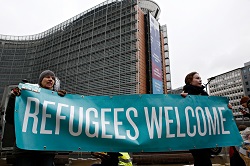Sustaining solidarity in Europe
Following the financial crisis of 2008 and the era of austerity that followed, Europe is now experiencing a period of political uncertainty. According to a Eurobarometer poll, there has been a steady, continuous decrease in the level of trust that EU citizens have towards government and democratic institutions. In fact, over the last six years, this level of trust has decreased by a remarkable 25 points. This erosion of trust has led to a lively public debate about the European project itself. According to some social scientists, the economic inequalities and new global order that have emerged since the crisis have contributed to a strong social reaction – one based on solidarity and aimed at achieving a better society for all. The EU-funded SOLIDUS (Solidarity in European societies: empowerment, social justice and citizenship) project analysed these acts of solidarity happening across Europe to understand their impact on employment, health, housing, education and civic engagement. “Our goal was to understand the social impact of these acts, or how they improved citizens’ lives by, for example, improving access to healthcare or creating jobs,” says SOLIDUS Project Coordinator Marta Soler. To accomplish this, project researchers started by looking at the common elements found among these different solidarity actions. They then used these elements to better understand how actions can have an actual social impact. To see how these elements could be transferred to the EU level, researchers also surveyed European citizens to get their opinions on transnational solidarity. Although the project’s initial focus was the economic crisis, it expanded its reach to include other developing crises. “The refugee crisis began after the project’s launch, so we adjusted and included solidarity with refugees in the cases to be analysed in all EU countries involved with the project,” says Soler. A diverse range of case studies In total, the project conducted 64 solidarity case studies in 12 different EU countries. For example, in Greece they studied a project that is helping children suffering from hearing problems integrate into the ‘normal’ community. Likewise, in Hungary, the project studied the work being done by Migszol, an informal, unregistered political grassroots organisation that monitors the country’s asylum-related policies. They played a major role in coordinating the initiatives to help the arriving migrants as they crossed from Serbia into the EU. From these case studies, researchers concluded that, with economic and social crisis comes an increasing number of solidarity actions, many of which are self-organised by citizens. “In general, Europeans believe that all EU citizens should be entitled to the same level of social security, regardless of which Member State they live in,” says Soler. “This is particularly true in the case of such vulnerable groups as the unemployed, the elderly and the sick.” Specifically, the project identified a number of factors that facilitate the social and political impact of solidarity initiatives. These include: internal democracy, transparency, pluralism, recognition, scalability, awareness, preparedness and meaning. According to Soler, these indicators help identify the social and political impact of solidarity initiatives. However, she also notes that there is a need for organisations to collect more data about the improvements their initiatives are bringing to society. Best practices in solidarity Although the project is officially over, work continues. Researchers are now in the process of disseminating a handbook on best practices for achieving social and political impact. “We are also collecting evidence about the impact that our findings are having on these various solidarity actions and the extent to which they are being implemented,” adds Soler.
Keywords
SOLIDUS, solidarity, EU, refugee crisis, Great Recession







